send questions about writing and i'll answer to the best of my ability!
Don't wanna be here? Send us removal request.
Text
more on writing muslim characters from a hijabi muslim girl
- hijabis get really excited over pretty scarves - they also like to collect pins and brooches - we get asked a lot of questions and it can be annoying or it can be amusing, just depends on our mood and personality and how the question is phrased - common questions include: - “not even water?” (referring to fasting) - hijabis hear a lot of “do you sleep in that?” (we don’t) and “where is your hair?” (in a bun or a braid, usually) - “is it mooze-slim or mozzlem?” (the answer is neither, it’s muslim, with a soft s and accent on the first syllable) - “ee-slam or iz-lamb?” (it’s iss-laam, accent on the first syllable) - “hee-job?” (heh-jahb, accent on the second syllable)
- “kor-an?” (no. quran. say it like koor-annn, accent on the second syllable) - people tend to mess up our names really badly and you just get a sigh and a resigned nod or an awkward smile, maybe a nickname instead - long hair is easy to hide, short hair is harder to wrap up - hijab isn’t just covering hair, it’s also showing as little skin as possible with the exception of face, hands, and feet, and not wearing tight/sheer clothing - that applies to men too, people just don’t like to mention it ( i wonder why) - henna/mehendi isn’t just for special occasions, you’ll see people wearing it for fun - henna/mehendi isn’t just for muslims, either, it’s not a religious thing - henna/mehendi is not just for women, men also wear it, especially on their weddings - there are big mehendi parties in the couple of nights before eid where people (usually just women and kids) gather and do each other’s mehendi, usually just hands and feet - five daily prayers - most muslim kids can stutter through a couple verses of quran in the original arabic text by the age of seven or eight, it does not matter where they live or where they’re from or what language they speak natively - muslim families tend to have multiple copies of the quran - there are no “versions” of the quran, there has only ever been one. all muslims follow the exact same book - muslims have no concept of taking God’s name in vain, we call on God at every little inconvenience - don’t use islamic phrases if you don’t know what they mean or how to use them. we use them often, inside and outside of religious settings. in islam, it is encouraged to mention God often and we say these things very casually, but we take them very seriously - Allahu Akbar means “God is Greatest” (often said when something shocks or surprises us, or if we’re scared or daunted, or when something amazing happens, whether it be good or bad; it’s like saying “oh my god”) - Subhan Allah means “Glory be to God” (i say subhan Allah at the sky, at babies, at trees, whatever strikes me as pleasant, especially if it’s in nature) - Bismillah means “in the name of God” and it’s just something you say before you start something like eating or doing your homework - In Shaa Allah means “if God wills” (example: you’ll be famous, in shaa Allah) (it’s a reminder that the future is in God’s hands, so be humble and be hopeful)
- Astaghfirullah means “i seek forgiveness from Allah” and it’s like “god forgive me” - Alhamdulillah means “all thanks and praise belong to God” and it’s just a little bit more serious than saying “thank god” (example: i passed my exams, alhamdulillah; i made it home okay, alhamdulillah) - when i say we use them casually, i really mean it - teacher forgot to assign homework? Alhamdulillah - our version of “amen” is “ameen” - muslims greet each other with “assalamu alaikum” which just means “peace be on you” and it’s like saying hi - the proper response is “walaikum assalam” which means “and on you be peace” and it’s like saying “you too”
222K notes
·
View notes
Text
I just discovered foodtimeline.org, which is exactly what it sounds like: centuries worth of information about FOOD. If you are writing something historical and you want a starting point for figuring out what people should be eating, this might be a good place?
224K notes
·
View notes
Text
Synonyms For Very
This masterlist is a masterlist of words that you may use alongside the word very, very being one of the most common words that are used when writing. I hope this helps you as much as it helps me in our writing seem more sophisticated and unique.
A:
Very accurate - exact Very afraid - fearful Very angry - furious Very annoying - exasperating
B:
Very bad - atrocious Very beautiful - exquisite Very big - immense Very boring - dull Very bright - luminous Very busy - swamped
C:
Very calm - serene Very careful - cautious Very cheap - stingy Very clean - spotless Very clear - obvious Very clever - intelligent Very cold - freezing Very colourful - vibrant Very competitive - cutthroat Very complete - comprehensive Very confused - perplexed Very conventional - conservative Very creative - innovative Very crowded - bustling Very cute - adorable
D:
Very dangerous - perilous Very dear - cherished Very deep - profound Very depressed - despondent Very detailed - meticulous Very different - disparate Very difficult - arduous Very dirty - filthy Very dry - arid Very dull - tedious
E:
Very eager - keen Very easy - effortless Very empty - desolate Very excited - thrilled Very exciting - exhilarating Very expensive - costly
F:
Very fancy - lavish Very fast - swift Very fat - obese Very friendly - amiable Very frightened - alarmed Very frightening - terrifying Very funny - hilarious
G:
Very glad - overjoyed Very good - excellent Very great - terrific
H:
Very happy - ecstatic Very hard - difficult Very hard-to-find - rare Very heavy - leaden Very high - soaring Very hot - sweltering Very huge - colossal Very hungry - ravenous Very hurt - battered
I:
Very important - crucial Very intelligent - brilliant Very interesting - captivating
J:
K:
L:
Very large - huge Very lazy - indolent Very little - tiny Very lively - vivacious Very long - extensive Very long-term - enduring Very loose - slack Very loud - thunderous Very loved - adored
M:
Very mean - cruel Very messy - slovenly
N:
Very neat - immaculate Very necessary - essential Very nervous - apprehensive Very nice - kind Very noisy - deafening
O:
Very often - frequently Very old - ancient Very old-fashioned - archaic Very open - transparent
P:
Very painful - excruciating Very pale - ashen Very perfect - flawless Very poor - destitute Very powerful - compelling Very pretty - beautiful
Q:
Very quick - rapid Very quiet - hushed
R:
Very rainy - pouring Very rich - wealthy
S:
Very sad - sorrowful Very scared - petrified Very scary - chilling Very serious - grave Very sharp - keen Very shiny - gleaming Very short - brief Very shy - timid Very simple - basic Very skinny - skeletal Very slow - sluggish Very small - petite Very smart - intelligent Very smelly - pungent Very smooth - sleek Very soft - downy Very sorry - apologetic Very special - exceptional Very strong - forceful Very stupid - idiotic Very sure - certain Very sweet - thoughtful
T:
Very talented - gifted Very tall - towering Very tasty - delicious Very thirsty - parched Very tight - constricting Very tiny - minuscule Very tired - exhausted
U:
Very ugly - hideous Very unhappy - miserable Very upset - distraught
V:
W:
Very warm - hot Very weak - frail Very well-to-do - wealthy Very wet - soaked Very wide - expansive Very willing - eager Very windy - blustery Very wise - sage Very worried - distressed
X:
Y:
Z:
A/N: If you know of anymore words I can add please message me.
157K notes
·
View notes
Photo
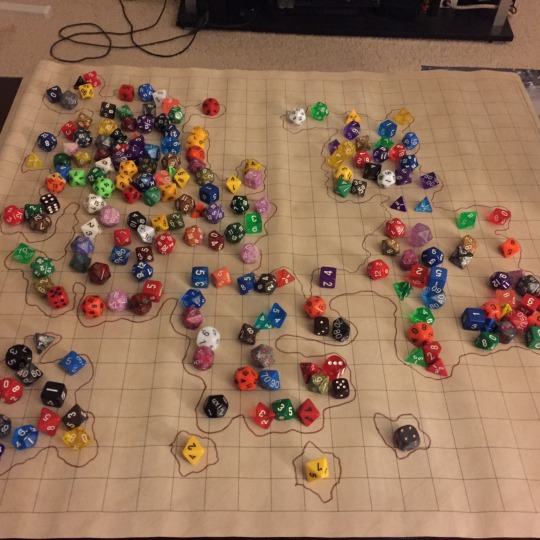
My super advanced mapmaking technique - a handful of dice makes the map nice
203K notes
·
View notes
Text
6 Writing Tips From John Steinbeck
1. Abandon the idea that you are ever going to finish. Lose track of the 400 pages and write just one page for each day, it helps. Then when it gets finished, you are always surprised.
2. Write freely and as rapidly as possible and throw the whole thing on paper. Never correct or rewrite until the whole thing is down. Rewrite in process is usually found to be an excuse for not going on. It also interferes with flow and rhythm which can only come from a kind of unconscious association with the material.
3. Forget your generalized audience. In the first place, the nameless, faceless audience will scare you to death and in the second place, unlike the theater, it doesn’t exist. In writing, your audience is one single reader. I have found that sometimes it helps to pick out one person—a real person you know, or an imagined person and write to that one.
4. If a scene or a section gets the better of you and you still think you want it—bypass it and go on. When you have finished the whole you can come back to it and then you may find that the reason it gave trouble is because it didn’t belong there.
5. Beware of a scene that becomes too dear to you, dearer than the rest. It will usually be found that it is out of drawing.
6. If you are using dialogue—say it aloud as you write it. Only then will it have the sound of speech.
7K notes
·
View notes
Text
Helpful things for action writers to remember
Sticking a landing will royally fuck up your joints and possibly shatter your ankles, depending on how high you’re jumping/falling from. There’s a very good reason free-runners dive and roll.
Hand-to-hand fights usually only last a matter of seconds, sometimes a few minutes. It’s exhausting work and unless you have a lot of training and history with hand-to-hand combat, you’re going to tire out really fast.
Arrows are very effective and you can’t just yank them out without doing a lot of damage. Most of the time the head of the arrow will break off inside the body if you try pulling it out, and arrows are built to pierce deep. An arrow wound demands medical attention.
Throwing your opponent across the room is really not all that smart. You’re giving them the chance to get up and run away. Unless you’re trying to put distance between you so you can shoot them or something, don’t throw them.
Everyone has something called a “flinch response” when they fight. This is pretty much the brain’s way of telling you “get the fuck out of here or we’re gonna die.” Experienced fighters have trained to suppress this. Think about how long your character has been fighting. A character in a fist fight for the first time is going to take a few hits before their survival instinct kicks in and they start hitting back. A character in a fist fight for the eighth time that week is going to respond a little differently.
ADRENALINE WORKS AGAINST YOU WHEN YOU FIGHT. THIS IS IMPORTANT. A lot of times people think that adrenaline will kick in and give you some badass fighting skills, but it’s actually the opposite. Adrenaline is what tires you out in a battle and it also affects the fighter’s efficacy - meaning it makes them shaky and inaccurate, and overall they lose about 60% of their fighting skill because their brain is focusing on not dying. Adrenaline keeps you alive, it doesn’t give you the skill to pull off a perfect roundhouse kick to the opponent’s face.
Swords WILL bend or break if you hit something hard enough. They also dull easily and take a lot of maintenance. In reality, someone who fights with a sword would have to have to repair or replace it constantly.
Fights get messy. There’s blood and sweat everywhere, and that will make it hard to hold your weapon or get a good grip on someone.
A serious battle also smells horrible. There’s lots of sweat, but also the smell of urine and feces. After someone dies, their bowels and bladder empty. There might also be some questionable things on the ground which can be very psychologically traumatizing. Remember to think about all of the character’s senses when they’re in a fight. Everything WILL affect them in some way.
If your sword is sharpened down to a fine edge, the rest of the blade can’t go through the cut you make. You’ll just end up putting a tiny, shallow scratch in the surface of whatever you strike, and you could probably break your sword.
ARCHERS ARE STRONG TOO. Have you ever drawn a bow? It takes a lot of strength, especially when you’re shooting a bow with a higher draw weight. Draw weight basically means “the amount of force you have to use to pull this sucker back enough to fire it.” To give you an idea of how that works, here’s a helpful link to tell you about finding bow sizes and draw weights for your characters. (CLICK ME)
If an archer has to use a bow they’re not used to, it will probably throw them off a little until they’ve done a few practice shots with it and figured out its draw weight and stability.
People bleed. If they get punched in the face, they’ll probably get a bloody nose. If they get stabbed or cut somehow, they’ll bleed accordingly. And if they’ve been fighting for a while, they’ve got a LOT of blood rushing around to provide them with oxygen. They’re going to bleed a lot.
Here’s a link to a chart to show you how much blood a person can lose without dying. (CLICK ME)
If you want a more in-depth medical chart, try this one. (CLICK ME)
Hopefully this helps someone out there. If you reblog, feel free to add more tips for writers or correct anything I’ve gotten wrong here.
248K notes
·
View notes
Text
Color Synonyms
White
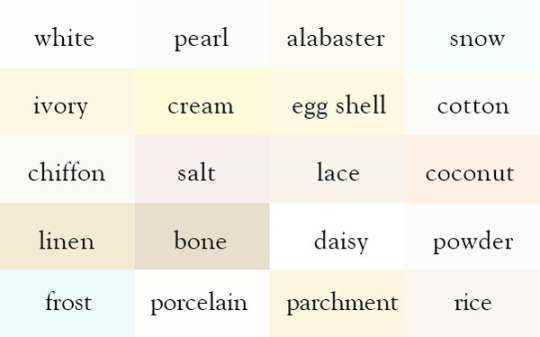
also: pale; blanched; sallow; pallid; waxen; spectral; translucent; albino;
Grey
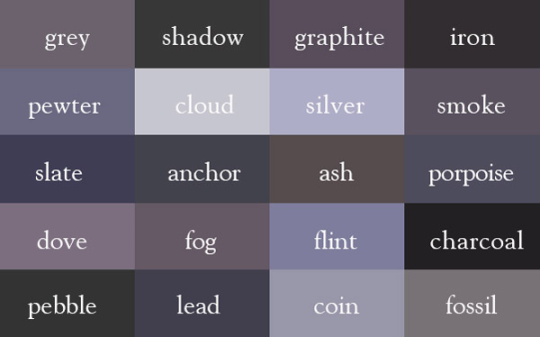
also: dust; stone; pepper;
Black

also: coal; slate; dusky; ebon; shadow; murky;
Tan
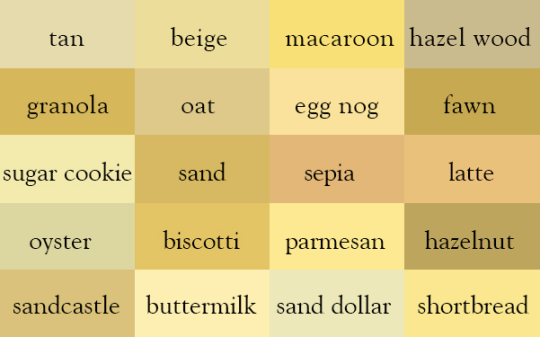
also: flesh; khaki; cream; tawny;
Brown
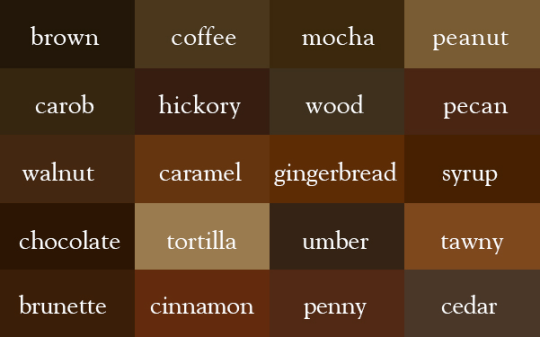
also: henna; russet; sepia; chestnut; cocoa; drab; bronze;
Red
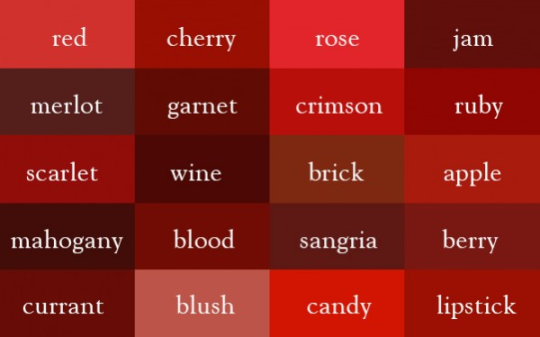
also: terracotta ; rouge; carmine; fire-engine; ruddy
Orange
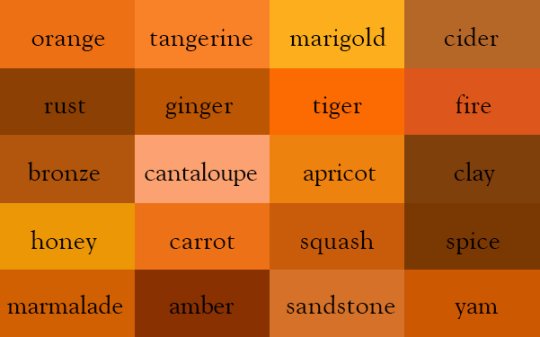
also: pumpkin ; rust ;
Yellow

also: sunny; amber; saffron; hay; straw; platinum;
Green
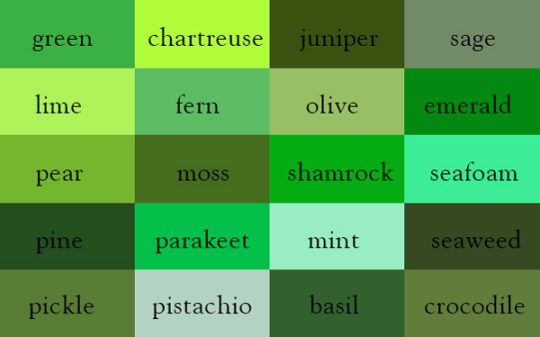
also: viridescent; grass; jade; forest;
Blue
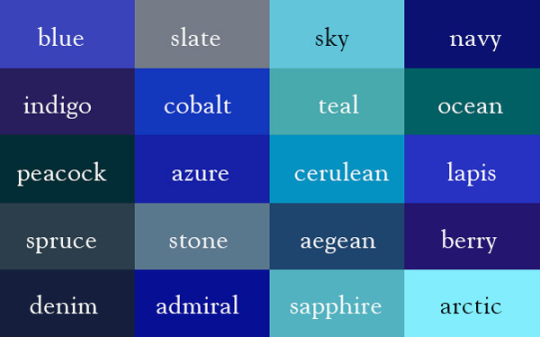
also: turquoise; cyan; ultramarine; royal; aqua; aquamarine;
Purple
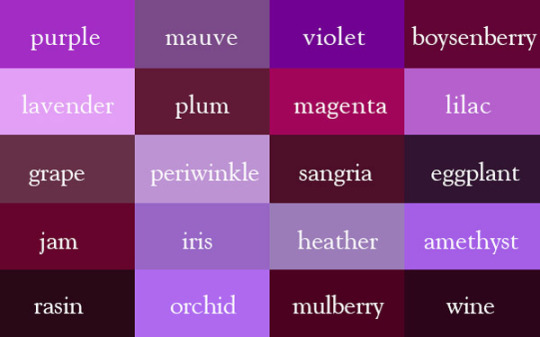
also: berry; amaranthine;
Pink

also: flushed; candy; cherry blossom; petal pink ;
—– source: http://ingridsundberg.com/
—–additional synonyms added by me
241K notes
·
View notes
Photo
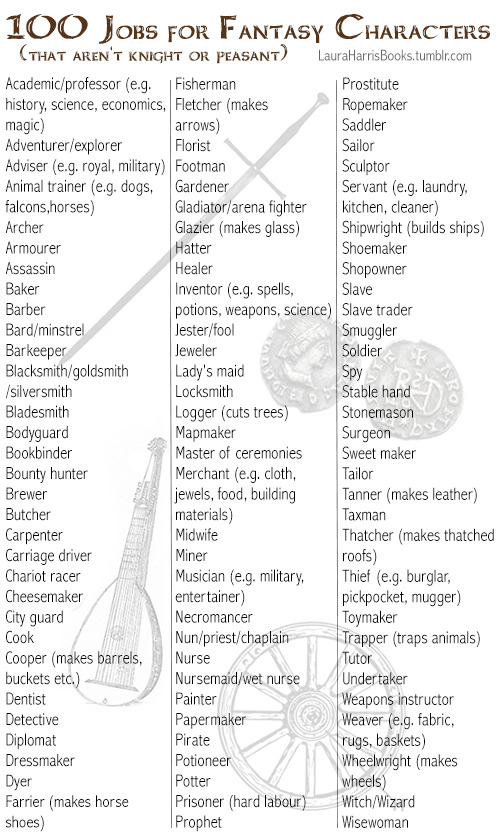
Beyond this, consider how these professions might vary depending on who the customers are - nobles, or lower class. Are they good at their job or just scraping by? Do they work with lots of other people or on their own? City or village?
For younger characters:
Apprentice to any of the above
Messenger/runner
Page/squire
Pickpocket
Shop assistant
Student
Looks after younger siblings
(Images all from Wikimedia Commons)
207K notes
·
View notes
Text
Personality/beliefs/philosophy character building questions:
Which deadly sin are they?
Which of the seven virtues are they?
If confronted with the need to choose: goodness or kindness? Do they believe in a distinction between the two? (Think the Witch vs the Baker from Into the Woods.)
What do they have the least tolerance for?
Which flaws are they aware of? Do they consciously work on them?
What view/belief are they most wrong about?
Their opinions on loyalty?
So you know their lawful/chaotic good/evil alignment. Do you want that to be a rule they function by for the entire work, or will they be challenged enough to shift into a different square?
Unless all of your characters have devoted a lot of time to puzzling out their philosophy, no one’s perfectly consistent. How are they hypocritical? Where do they contradict themself? Will they be challenged on it?
How does their personality present conflicts and challenges in their setting/story?
I don’t write often enough and am not an expert, but I was making this for my own reference and thought someone else might want it?
2K notes
·
View notes
Link

@kurtmckinnon thank you so much!! if you have time and are willing to, please reblog this post or leave a comment, i would appreciate it so, so much <3
Chapters: 1/1 Fandom: Rope (1948) Rating: Mature Warnings: Creator Chose Not To Use Archive Warnings Relationships: Phillip Morgan/Brandon Shaw, Phillip Morgan/David Kentley, David Kentley/Janet Walker, Kenneth Lawrence/Janet Walker, Brandon Shaw/Janet Walker Characters: Phillip Morgan, Brandon Shaw, David Kentley, Janet Walker, Kenneth Lawrence, Rupert Cadell Additional Tags: Alternate Universe - Canon Divergence, Post-Canon Series: Part 2 of murder can be an art, too
Summary: Who’d have thought that a beautiful, gentle soul like that could just as easily choke the life out of a fellow human being?
11 notes
·
View notes
Link
Chapters: 1/1 Fandom: Rope (1948) Rating: Mature Warnings: Creator Chose Not To Use Archive Warnings Relationships: Phillip Morgan/Brandon Shaw, Phillip Morgan/David Kentley, David Kentley/Janet Walker, Kenneth Lawrence/Janet Walker, Brandon Shaw/Janet Walker Characters: Phillip Morgan, Brandon Shaw, David Kentley, Janet Walker, Kenneth Lawrence, Rupert Cadell Additional Tags: Alternate Universe - Canon Divergence, Post-Canon Series: Part 2 of murder can be an art, too
Summary: Who'd have thought that a beautiful, gentle soul like that could just as easily choke the life out of a fellow human being?
11 notes
·
View notes
Text
How to write fic for Black characters: a guide for non-Black fans
Don’t characterize a Black character as sassy or thuggish, especially when the character in question is can be described in literally ten thousand other ways..
Don’t describe Black characters as chocolate, coffee, or any sort of food item.
Don’t highlight the race of Black characters (ie, “the dark man” or “the brown woman”) if you don’t highlight the race of white characters.
Think very carefully about that antebellum slavery or Jim Crow AU fic as a backdrop for your romance.
If you’re not fluent with AAVE, don’t use it to try to look cool or edgy. You look corny as hell.
Don’t use Black characters as a prop for the non-Black characters you’re actually interested in.
Keep “unpopular opinions” about racism, Black Lives Matter, and other issues pertinent to Black folks out the mouths of Black characters. We know what the fuck you’re doing with that and need to stop.
Don’t assume a Black character likes or hates a certain food, music, or piece of pop culture.
You can make a Black character’s race pertinent without doing it like this.
Be extremely careful about insinuating that one or more of a Black character’s physical features are dirty, unclean, or ugly.
Feel free to add more.
105K notes
·
View notes
Note
Hey. Do you know how and under what circumstances people drown and generally some advice on writing a character that's drowning? Thank you, love the blog
Thanks for your question my friend, and I’ll admit, it’s a good one. Before we begin, I want to give a trigger warning on drowning.
Drowning is pretty much the most terrifying way to go, in my opinion. And a lot of people’s opinions at that. Since breathing is a natural, necessary thing we sometimes take for granted it can be nightmarish to have that taken away. So, as for ‘how people drown’, here are the mental and physical sensation of drowning-
A drowning person would not be thinking clearly, doing anything possible to survive. They will be panicking, fighting, struggling to stay alive. This only causes the oxygen in the body to run out faster. Once water is in the lungs, some people feel calm or tranquil.
The average amount of time a person can hold their breath in a calm, relaxed environment is two minutes. After this that person will be forced to inhale the water around them; and the act of doing so will cause them to cough and try to spit it out. This evidently leads to the inhalation of more water.
When water enters the lungs and fills them, the lungs will feel like they’re burning or tearing. Water in the lungs or stomach will make the person heavier, and, if they’re deep enough, they will sink faster.
As for the circumstances under which people drown, there are many. There are many reason why people drown, and here are a couple I managed to dig up:
In deep or cold water, many people panic. This causes them to exhale, which means they will sink. A person with lungs full of air has a better chance of floating in deep water.
Children are more likely to drown than other age groups. About one in five people who drown are under fourteen years old.
Common causes of drowning include an inability to swim, falling through thin ice (the cold of the water shocks the body, dropping the heart rate and freezing the limbs) or being intoxicated around bodies of water.
Technically, drowning could refer to inhaling any liquid to the point where no oxygen is able to enter the lungs and bloodstream.
I hope these tidbits of information help you, and good luck with your writing! If you need to ask more questions, feel free to ask again.
- Mod Jazz
If you need advice on general writing or fanfiction, you should maybe ask us!
332 notes
·
View notes
Note
For the ticket request, can you continue Forgotten? Thanks!
ficlet request friday 8.18.17 ★ askbox
This ficlet’s also on AO3!
REVELATION
Notes: Sorry it took so long to answer this request! I’ve been horribly busy, but I’ll try to answer as many asks as I can over the next few months.
[Part 1 - Forgotten] [Part 2 - Remembrance]
“Witch!” he shrieked, picking up a vial of something no doubt very magical and throwing it on the floor. It neither smashed nor spilled, and he was left feeling very dissatisfied - and still infuriated.
The sorceress in question was indifferent to his rage; if anything, she was nonchalant at best. She leaned down to pick up the bottle, rolling to and fro on the dipped, dilapidated floor of her hovel, and set it back where LeFou had originally found it.
“I understand that you’re upset,” she began, but he immediately cut her off with a strange, choking snort.
“That’s an understatement,” he said. His throat was inordinately dry, and he felt that if he were to articulate what he was really feeling, it was sure to burn like sandpaper.
“I couldn’t account for everything,” Agathe argued, wringing her ragged skirt in her hands and effectively betraying her own anxiety. “I didn’t think that the two of you would ever fall in love again -”
“Again?” LeFou hissed, nearing apoplexy. “What do you mean again? When were we ever in love in the first place? It was only ever me pining after him, and his oblivious - awful - horrendous self pretending I didn’t exist!”
“That’s where you’re wrong. He loved - he has always loved you.”
“True love’s kiss didn’t save him,” said LeFou, burying his face in his hands for a moment in an attempt to hide the wetness of his eyes. “I thought that was supposed to break any curse.”
“Yes,” the enchantress agreed. “It did work, it just… broke the curse keeping him alive.”
He blinked at her a few times, wanting very desperately to die.
“Why didn’t it let me remember and save his life, then? When Belle kissed Adam, he was brought back to life and transformed -”
“My magic,” Agathe said, somewhat firmly, “has its limits. That spell spanned ten years; yours only lasted ten months. The enchantment would’ve grown with time - perhaps, if you had waited just a bit longer, you would’ve gotten your happy ending. I know that doesn’t exactly do you much good now, but…”
LeFou waited for her to finish, but she trailed off, evidently lost in thought.
“Is there any way to bring him back? Is there anything I can do?”
“You can mourn,” she said serenely. “Remember him as he was, and cherish the days you had that you were never meant to have.”
“Yes, cherish the memory of him dropping dead at my feet,” LeFou spat. He wished that she had killed him instead; that the curse had taken his life instead of Gaston’s; that he had been the one to sink to his feet, his shirt smeared with scarlet blotches and his arm at a disjointed angle and his lips parted in a bitter smile…
20 notes
·
View notes
Link
Chapters: 1/1 Fandom: Rope (1948) Rating: Mature Warnings: Creator Chose Not To Use Archive Warnings Relationships: Phillip Morgan/Brandon Shaw, Kenneth Lawrence/Janet Walker Characters: Phillip Morgan, Brandon Shaw, Brandon Shaw's Mother, David Kentley, Mrs. Wilson, Rupert Cadell, Henry Kentley, Mrs. Atwater, Phillip Morgan's Mother, Janet Walker, Mrs. Kentley, Kenneth Lawrence Additional Tags: Alternate Universe - Canon Divergence
Summary: "What makes me any different?" Phillip asked, and it was a genuinely good question. Brandon certainly would've answered if he knew how.
12 notes
·
View notes
Text
Are These Filter Words Weakening Your Story?
After putting my writing on hold for several weeks, I decided to jump back in. I expected to find all sorts of problems with my story–inconsistencies in the plot, lack of transitions, poor characterization–the works. But what began to stick out to me was something to which I’d given little thought in writing.
Filter words.
What are Filter Words?
Actually, I didn’t even know these insidious creatures had a name until I started combing the internet for info.
Filter words are those that unnecessarily filter the reader’s experience through a character’s point of view. Dark Angel’s Blog says:
“Filtering” is when you place a character between the detail you want to present and the reader. The term was started by Janet Burroway in her book On Writing.
In terms of example, you should watch out for:
To see
To hear
To think
To touch
To wonder
To realize
To watch
To look
To seem
To feel (or feel like)
Can
To decide
To sound (or sound like)
To know
I’m being honest when I say my manuscript is filled with these words, and the majority of them need to be edited out.
What do Filter Words Look Like?
Let’s imagine a character in your novel is walking down a street during peak hour.
You might, for example, write:
Sarah felt a sinking feeling as she realized she’d forgotten her purse back at the cafe across the street. She saw cars filing past, their bumpers end-to-end. She heard the impatient honk of horns and wondered how she could quickly cross the busy road before someone took off with her bag. But the traffic seemed impenetrable, and she decided to run to the intersection at the end of the block.
Eliminating the bolded words removes the filters that distances us, the readers, from this character’s experience:
Sarah’s stomach sank. Her purse—she’d forgotten it back at the cafe across the street. Cars filed past, their bumpers end-to-end. Horns honked impatiently. Could she make it across the road before someone took off with her bag? She ran past the impenetrable stream of traffic, toward the intersection at the end of the block.
Are Filter Words Ever Acceptable?
Of course, there are usually exceptions to every rule.
Just because filter words tend to be weak doesn’t mean they never have a place in our writing. Sometimes they are helpful and even necessary.
Susan Dennard of Let The Words Flow writes that we should use filter words when they are critical to the meaning of the sentence.
If there’s no better way to phrase something than to use a filter word, then it’s probably okay to do so.
Want to know more?
Read these other helpful articles on filter words and more great writing tips:
Filter Words and Distancing Point of View
The Reasons Editors reject Manuscripts
Filter Those words and Strengthen Your Writing
44K notes
·
View notes


